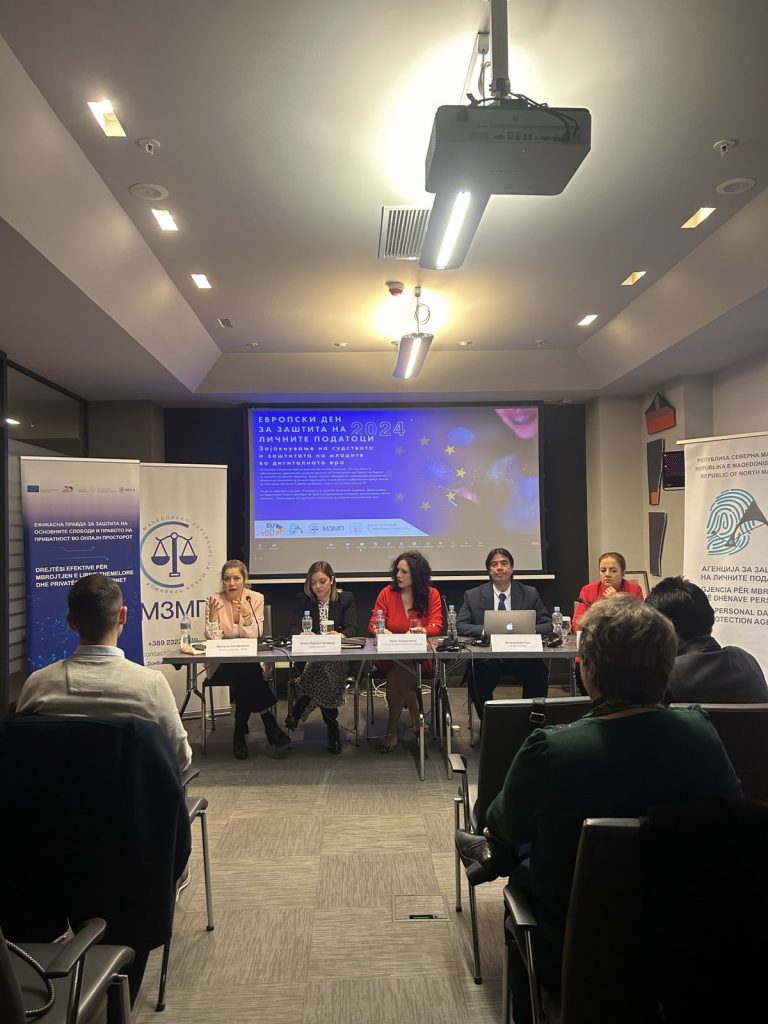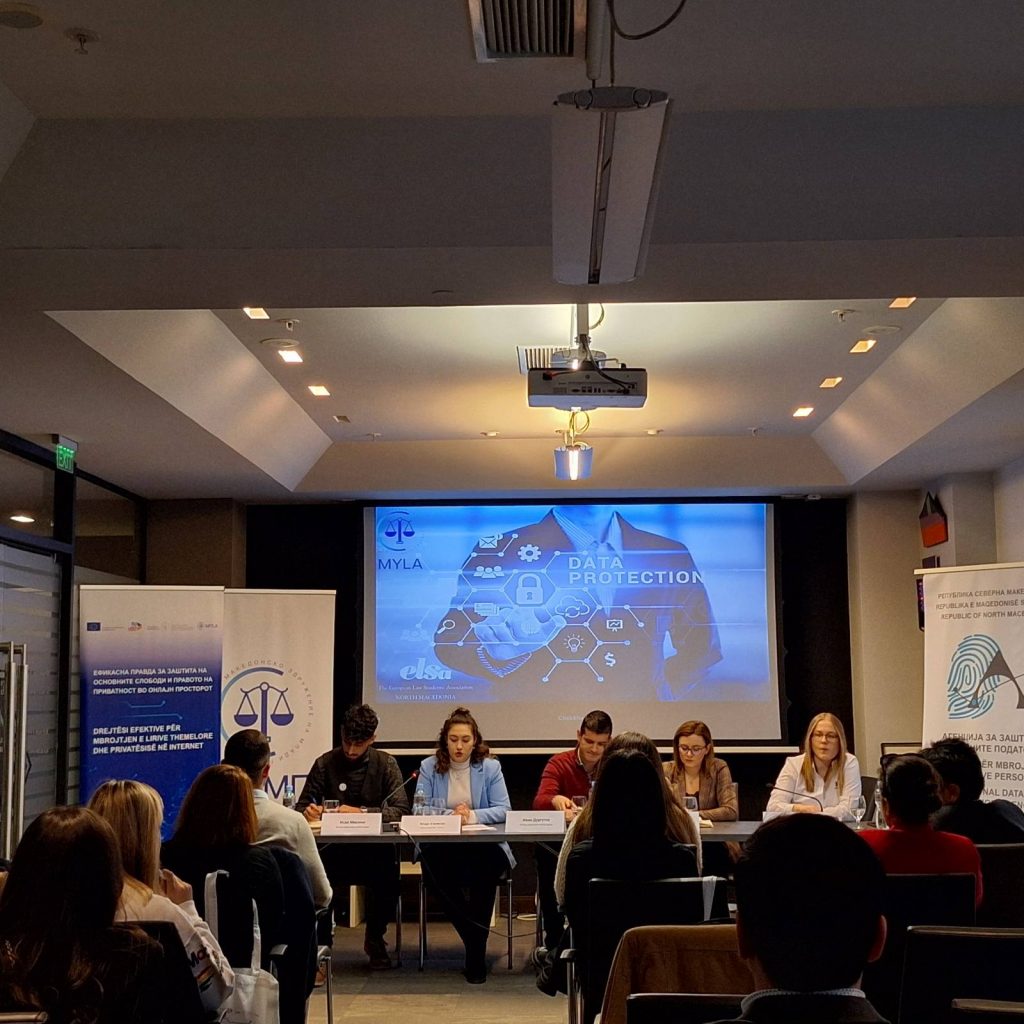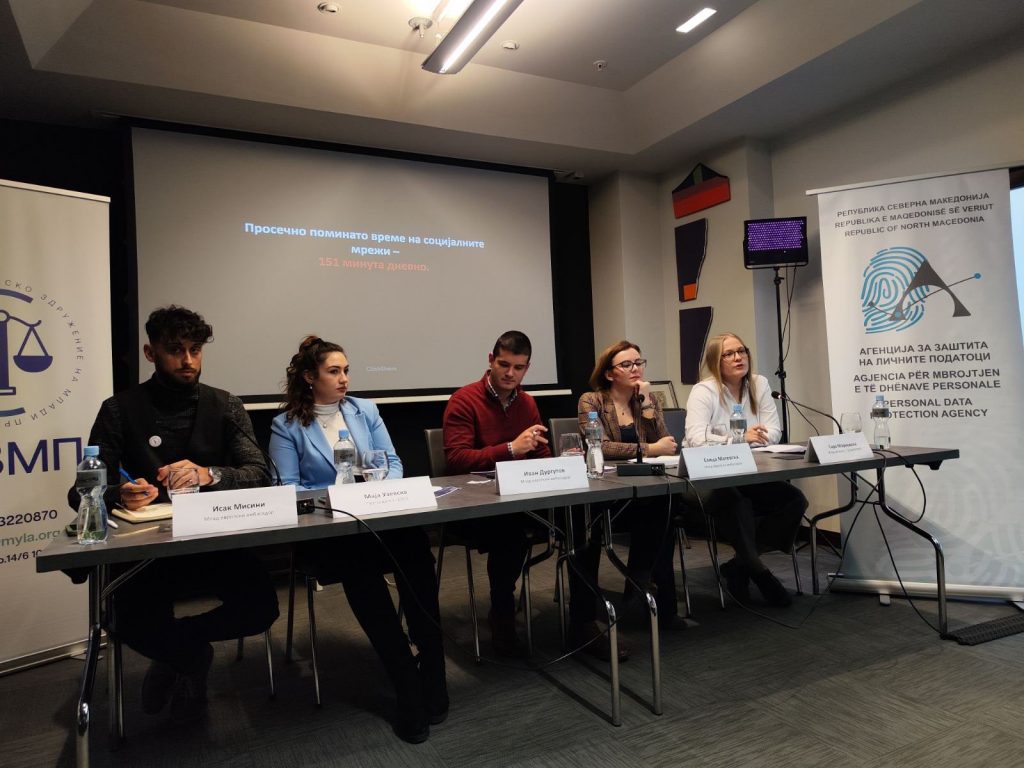
In an era where digital transformation is reshaping every aspect of our lives, the imperative to protect personal data has never been more important. This urgency is especially pronounced when considering the role of the judiciary in upholding the laws for the protection of personal data and the need to protect our most vulnerable population – the youth, from the countless risks that the digital world brings.
It is in this light that the Center for Legal Research and Analysis organized an event to mark the European Data Protection Day under the title “Strengthening the judiciary and protecting the youth in the digital age”. The event was organized within the project “Effective justice to protect fundamental freedoms and privacy of people in the on-line space ” funded by EU .
The protection of personal data and privacy is one of the fundamental pillars of a democratic society. As an affirmation of our commitment to creating legal systems that serve the best interest of citizens, we must continuously create laws that keep up with and constantly adapt to the progress of technology, said European Ambassador David Geer. The European Commission, in the latest report on the progress of our country in the area of personal data protection and privacy, notes satisfactory progress in that regard but highlights the need for training of employees in the public and private sector who deal with personal data processing – adds Geer.
“The protection of personal data, apart from a legal obligation, requires cultivating a culture and awareness of the development of this sphere. We should all, individually and as a community, behave responsibly and build a safe digital environment for everyone,” said Imer Aliu, Director of the Agency for Personal Data Protection.
He pointed out that the biggest problem regarding the legislation in this area is that hundreds of sectoral laws are not in line with the Personal Data Protection Law. Serious institutional and Government support is needed to facilitate the process of changing and supplementing the relevant laws in accordance with the Law on Personal Data Protection. In addition, a new Strategy for the protection of personal data is currently being developed, in which the challenges brought by the progress of the digital society will be addressed – he added.
Mrs. Natasha Gaber-Damjanovska , Director of the Academy for Judges and Public Prosecutors, addressed the question of the dynamics between the speed of technology development, how the legal system is keeping up with that speed, and the chances of abuses and crimes that open up in that space. We need an institutional response and equipped staff that will deal with the problems of modern life. In that regard, the Academy for Judges and Prosecutors makes a promise to actively raise awareness of the importance of personal data protection and privacy and to ensure continuous improvement of the Academy’s program and curriculum.
Lidija Stojkova Zafirovska, president of the executive board of the Center for Legal Research and Analysis, emphasized that it is important to consider this topic from an individual perspective. Every person has the right to have these fundamental rights safe-guarded. This is the only approach that will enable us to establish a system capable of addressing these issues, she emphasized.
The president of the Macedonian Young Lawyers Association, Alexandra Cvetanovska, conveyed their dedication to enhancing skills and knowledge, and emphasized that collaborative efforts between civil society organizations and institutions are essential to effectively address and improve the current situation.
Milena Josifovska from the Center for Legal Research and Analysis highlighted the key outcomes of the past year under the European project. These achievements include the development of a Guideline for legal practitioners for the protection of privacy rights in the digital space, an Analysis of gaps and challenges for efficient justice in safeguarding personal data and privacy, an Assessment of the need for training for judges and public prosecutors, and the creation of a curriculum for training of judiciary. She outlined the plans for the upcoming year, which involve organizing training sessions for the judiciary and conducting in-depth analyses of the law and technology, with a specific focus on the application of artificial intelligence in the judiciary.
EU policy developments in the past period have increasingly focused on the protection of young people in the digital world, emphasizing the need for a balance between innovation and privacy protection. The more technology transforms our lives, especially the life of the youth, the more the challenge increases to protect young people and children’s privacy – shared Ms. Emes Savoia-Keletti, Personal Data Protection Officer, European External Action Service.
“The legal framework, led by documents like the GDPR, the ePrivacy Directive and upcoming acts like the Digital Services Act, underline the EU’s commitment to creating a secure digital environment. We strengthen this commitment by making joint efforts, i.e. developing initiatives, harmonizing the legislation in North Macedonia, in order to be stronger in the fight for the protection of personal data and the privacy of young people and children in Europe” – she pointed out.
Elena Mujoska – a legal expert, addressed the gaps and challenges in ensuring effective protection of the right to privacy in the digital space. She specifically discussed the analysis titled “Gaps and Challenges for Effective Justice for the Protection of Personal Data and the Right to Privacy.” Mujoska emphasized that a significant issue permeating through these challenges is the inadequate practical implementation of adopted laws and strategies, coupled with a shortage of staff in the Agency for the Protection of Personal Data.
Furthermore, she highlighted discrepancies in court practices nationwide concerning cases impacting the right to the protection of personal data and privacy. Even in nearly identical situations with the same circumstances, the courts render different judgments, introducing inconsistencies in the legal landscape.
Mrs. Irena Bojadzievska, Expert for Personal Data Protection, further delved into the subject, advocating for consultations not only with international court practices but also with domestic judges experienced in this field. She underscored the necessity of developing digests of court judgments from the European Court of Human Rights and the European Court of Justice, offering valuable assistance to judges and prosecutors handling cases requiring protection of personal data and privacy. Additionally, she urged the establishment of a network among judges at both domestic and international levels to facilitate a swift and seamless exchange of knowledge and experiences.
Following this perspective, Mrs. Eva Suhrada Kirschmeier, a Judge at the Federal Administrative Court in Austria, shared insights from her extensive experience in personal data protection and privacy within the Austrian judiciary. She pinpointed the issue of inadequate cooperation and knowledge exchange among judges specializing in this field, stressing its significance due to the emerging nature of the questions requiring interpretation. Kirschmeier also addressed the overload on Austria’s justice system since the implementation of the GDPR, highlighting the imperative to bolster capacities and staffing to effectively handle this matter.
G. Aleksandar Gojo, a legal expert, referred to a research indicating that 84% of individuals who have encountered technology at some point in their lives have faced threats to their personal data and privacy in cyberspace. Gojo, author of the Guideline for legal practitioners for the protection of privacy rights in the digital space, compiled general terms from the digital sphere’s vocabulary and judgments from international jurisprudence. The guide is designed to assist legal professionals in navigating emerging issues, helping them crystallize their understanding, and shape their perspectives on the subject.
Mrs. Slobodanka Slavkovska, Head of Department and Chief Supervisor at the Agency for Personal Data Protection, provided insights into the medium-term expectations and the upcoming Strategy for the Protection of the Right to Privacy. She conveyed that the new Strategy, slated for adoption by the middle of this year, aims to fortify the right to personal data protection in alignment with European and international standards. The strategy also envisions harmonizing sectoral laws with the Law on the Protection of Personal Data. Emphasizing the significance of enhancing the capacities of personnel involved in this field, particularly among judges and prosecutors, Slavkovska highlighted the importance of education through long-term programs rather than one-day trainings.
Following the conclusion of this session, an engaging discussion ensued with questions from the audience. Topics covered included jurisdictional issues related to cyberspace, the Budapest Convention, and the sharing of experiences and perspectives among audience participants.
The third session moderated by Young European Ambassador Isak Misini, was dedicated to young people in the digital world, providing an opportunity to hear their opinions on whether and to what extent they are aware of their rights. The first to speak was Maja Uzhevska, President of ELSA, who referred to the researchconducted in collaboration with MYLA, focusing on the awareness of young law students about the protection of personal data. The research consisted of short questions from everyday situations that encroach on the right to protect personal data, and to which the students showed a relative ignorance of their rights. This speaks of the necessity of improving and adapting educational programs that should help young people to understand their rights and how to protect themselves in the event of their violation.
Ivan Durgutov, Young European Ambassador, continued, pointing out that in a democracy, comprehensive education is needed starting from the earliest age – “Digital rights should be known by everyone, regardless of whether they are lawyers or not,” he says. It is necessary to adjust the language and length of the manuals, which are often too long and young people do not understand them, he adds.
“Young people are just beginning to acknowledge and understand the Law on personal data protection and the concept of personal data itself. The concept of security assumes a new significance in the digital age, particularly as the youngest individuals are the most susceptible to cyber-attacks. Therefore, education about their rights by parents and teachers in schools is paramount.” says Elitsa Matevska, Young European Ambassador.
In her role as a youth activist, Sara Markovska concluded the session by introducing a campaign dedicated to the protection of personal data, which she and 14 other activists have diligently worked on over the past period. The campaign’s objective is to educate young people, including those in elementary, high school, and university, about the safety and protection of their personal data when using social networks—platforms where they predominantly spend their time. The absence of a formal program addressing personal data issues was a motivating factor behind the necessity of such a campaign. The goal is to inform young individuals about online personal data protection through an informal and easily understandable approach facilitated by trained activists via social networks.








